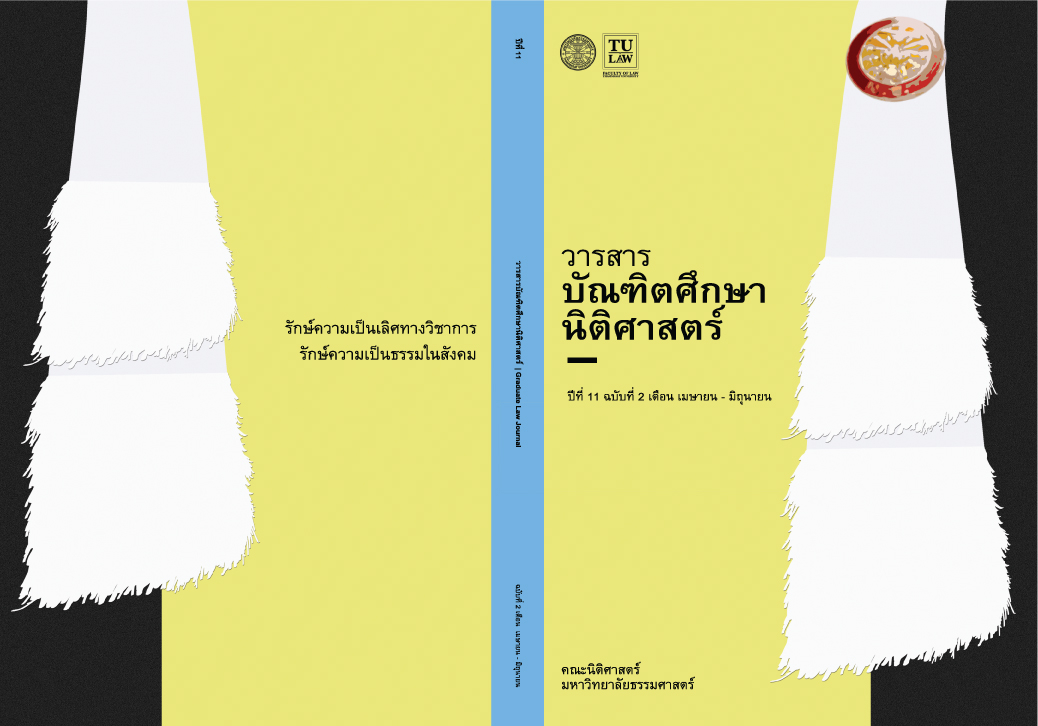ข้อจำกัดอำนาจในการตรากฎหมายนิรโทษกรรม
บทคัดย่อ
สนธิสัญญาสิทธิมนุษยชนระหว่างประเทศหลายฉบับได้กำหนดหน้าที่ให้
รัฐภาคีแห่งสนธิสัญญาต้องดำเนินคดีอาญาแก่ผู้ละเมิดสิทธิมนุษยชนอย่างร้ายแรงไว้ ส่งผลให้เป็นการจำกัดขอบเขตการนิรโทษกรรมว่าไม่สามารถนิรโทษกรรมความผิด
ที่ละเมิดสิทธิมนุษยชนอย่างร้ายแรงได้ ประกอบกับรัฐธรรมนูญของแต่ละประเทศ
ซึ่งเป็นกฎหมายสูงสุดก็ได้ประกันสิทธิเสรีภาพของประชาชนไว้ ทำให้การนิรโทษกรรมไม่อาจจะทำอย่างไรก็ได้โดยไม่มีข้อจำกัด แต่จะต้องคำนึงถึงสิทธิมนุษยชน และสิทธิ
ทางรัฐธรรมนูญด้วย
เอกสารอ้างอิง
ประจักษ์ ก้องกีรติ. ประชาธิปไตยในยุคเปลี่ยนผ่าน. นนทบุรี : สำนักพิมพ์
ฟ้าเดียวกัน. 2558. น. 335.
วรเจตน์ ภาคีรัตน์. คำสอนว่าด้วยรัฐและหลักกฎหมายมหาชน. กรุงเทพมหานคร : โครงการตำราและเอกสารประกอบการสอน คณะนิติศาสตร์ มหาวิทยาลัยธรรมศาสตร์. 2555. น. 73 – 74.
บรรเจิด สิงคะเนติ. หลักพื้นฐานเกี่ยวกับสิทธิเสรีภาพ และศักดิ์ศรีความเป็นมนุษย์. พิมพ์ครั้งที่ 5. กรุงเทพมหานคร : สำนักพิมพ์วิญญูชน, 2558. น. 134 - 135.
วิทยานิพนธ์
Phenyo Tshenolo Keiseng Rakate. “The Duty to Prosecute and the Status of Amnesties Granted for Gross and Systematic Human Rights Violations in International Law : Towards a Balanced Approach Model,” Ph.D. dissertation, University of South Africa, 2004.
p. 58.
Articles
Michael P. Scharf. “The Amnesty Exception to the Jurisdiction of
the International Criminal Court.” Cornell International Law Journal 32, p. 514 (1999).
Anja Seibert-Fohr. “The Fight against Impunity under the International Covenant on Civil and Political Rights.” Max Planck Yearbook of United Nations Law 6, p. 303 (2002).
Mark Freeman. Necessary Evils : Amnesties and the Search for Justice, New York : Cambridge University Press, 2011. p. 152.
Electronic
Josepha Close. “Amnesty Provisions in Constitutions of the World :
A Comparative Analysis.” https://aninternationallawblog.
wordpress.com/2015/01/05/amnesty-provisions-in-
the-constitutions-of-the-world-a-comparative-analysis/. October 2, 2015.
ดาวน์โหลด
เผยแพร่แล้ว
ฉบับ
ประเภทบทความ
สัญญาอนุญาต
บทความหรือข้อความคิดเห็นใด ๆ ที่ปรากฏในวารสารบัณฑิตศึกษานิติศาสตร์เป็นความรับผิดชอบของผู้เขียนบทความโดยเฉพาะ คณะนิติศาสตร์ มหาวิทยาลัยธรรมศาสตร์ และกองบรรณาธิการไม่จำเป็นต้องเห็นด้วย



